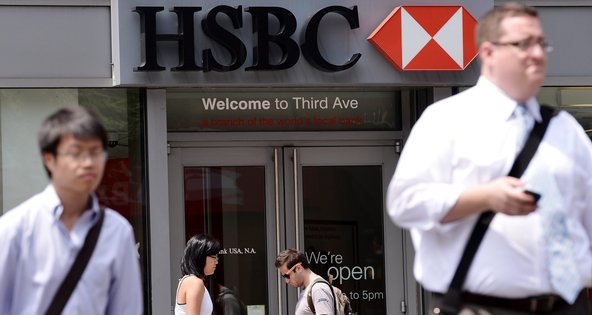 Justin Lane/European Pressphoto AgencyAn HSBC branch in Manhattan. The bank has set aside $700 million to cover the cost of potential fines.
Justin Lane/European Pressphoto AgencyAn HSBC branch in Manhattan. The bank has set aside $700 million to cover the cost of potential fines.
The legal headaches at HSBC may not go away anytime soon, and when they do, the resolutions could be costly.
The first problem is the extent of government scrutiny of the bank.
HSBC has been ensnared by some of the largest federal inquiries into the banking industry. The government is looking into whether the bank ran afoul of restrictions on dealings with countries subject to economic sanctions, including Iran and Cuba. It is investigating HSBC for possible violations of regulations against money laundering. Authorities are also focusing on HSBC as part of the broad inquiry into rate rigging.
White Collar Watch
View all posts
The eventual costs could be sizable.
In a recent filing, the bank disclosed that it had set aside $700 million to pay potential penalties associated with the investigation related to money laundering and one mounted by the Office of Foreign Assets Control into dealings with countries subject to economic sanctions. But that amount looks to be on the low side of its potential exposure, according to an article in The New York Times.
Federal authorities think HSBC could end up paying at least $1 billion. The bank itself said “it is possible that the amounts when finally determined could be higher, possibly significantly higher.”
And that does not account for the potential cost to beef up its compliance standards.
The government’s regulations enforcing economic sanctions could be portrayed as mere technicalities, a reflection of the long-standing antipathy between the United States and Iran and Cuba that have been foisted on the banking system. Money laundering, on the other hand, is something clearly prohibited by every developed nation because of fears the banks can be used to finance terrorists and drug dealers.
A report issued by a Senate subcommittee claims the bank ignored numerous warnings about the operation of its Mexican subsidiary, which allowed bulk cash transfers of billions of dollars on behalf of clients that may have included drug cartels.
A spokesman for HSBC asserted that this “case is not about HSBC complicity in money laundering. Rather, it’s about lax compliance standards that fell short of regulators’ expectations and our expectations, and we are absolutely committed to remedying what went wrong and learning from it.”
As such, any settlement over the matter is likely to require HSBC to enhance its compliance protocols for money laundering. In other cases involving accounting fraud, federal prosecutors have mandated the appointment of an outside monitors, sometimes for three or more years. With operations in 84 countries and 60 million customers, the cost of an outside monitor for HSBC would be significant if the government wants someone to keep an eye on the bank’s internal controls.
HSBC has been pushing to settle the investigations quickly, but whether prosecutors and regulators are willing to wrap up the cases in a short time period remains to be seen.
One potential roadblock is the investigation into rate manipulation. HSBC is among more than a dozen banks that helped set a benchmark rate known as the London offered interbank rate, or Libor.
Given that HSBC is part of that inquiry, authorities may be reluctant to settle the other matters before they know the full extent of the bank’s exposure to the Libor case. Prosecutors will want to avoid the appearance of going easy on HSBC by entering into a string of settlements in which the bank pays a chunk of money while only being required to promise to be good in the future.
The potential costs associated with the Libor case may only add to HSBC’s woes. Barclays paid $450 million to settle allegations by global regulators related to the Libor case. Along with the investigations by regulators around the global, the Libor case also holds the potential for significant financial exposure to civil lawsuits for antitrust violations.
HSBC has not begun to put a figure on its potential bill for Libor. In its latest earnings results, the bank said it had not yet set aside money for potential fines or settlements related to the global investigation.
“Based on the facts currently known, it is not practicable at this time for HSBC to predict the resolution of these regulatory investigations or private lawsuits, including the timing and potential impact on HSBC,” the bank said in a statement.
Peter J. Henning, who writes White Collar Watch for DealBook, is a professor at Wayne State University Law School.
Article source: http://dealbook.nytimes.com/2012/08/28/hsbcs-mounting-legal-liability/?partner=rss&emc=rss
